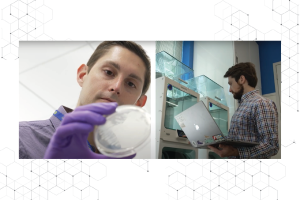
An immunotherapeutic drug that uses RNA nanoparticles to treat cancer. A set of wearable sensors that collect spine data throughout the day. These two products, tackling very different problems, share one thing in common: The two startups developing them are both funded by the President’s Venture Fellowship.
The President’s Venture Fellowship is a new student entrepreneurship award administered by FastForward U, with a spring application cycle. These first fellows both come from biotech, but the award is industry agnostic. Fellows receive a $100,000 award for their venture, a $40,000 one-year salary stipend, free lab space at Johns Hopkins Technology Ventures, co-working space at FastForward U, a partial scholarship to the Carey Business School, and mentorship from university leadership and alumni. The fellowship is funded by the Office of the President and alumni contributions.
“The donors who have supported these generous fellowships truly believe in our entrepreneurial mission and know that our students’ innovations will help tackle some of society’s most complex and persistent challenges,” says Johns Hopkins University President Ronald J. Daniels.
Christy Wyskiel, executive director of Johns Hopkins Technology Ventures, says the fellowship came out of conversations she had with Daniels about creating more technology-based companies in Baltimore and more entrepreneurial opportunities for students.
“We talked about how to get more students to leave the lab and, as they graduate, to think about being entrepreneurs and building companies based on the technology that they know so well,” Wyskiel says.
“We realized that our students, like so many founders and entrepreneurs, have struggled to attain the first round of venture funding that shows them that their ambition and vision is worth pursuing,” Daniels says. “The President’s Venture Fellowship is designed to overcome that hurdle.”
The first winners of the fellowship are Taylor Cottle, Ph.D., (Med ’23) M.B.A.(Bus ’27), chief scientific officer and co-founder of Aptabridge Therapeutics, and Evan Haas, M.S.E. (Engr ’23), M.B.A., (Bus ’27), chief executive officer and co-founder of CurveAssure.
Aptabridge Therapeutics is creating a new immunotherapeutic drug that will boost the immune system’s ability to find different cancer cells.
“We’re building a T-cell engager, which essentially is a glue between your existing immune cells and some cancer surface marker,” Cottle says. “If you add this drug into the blood, it will increase the chance that your T-cell can find that cancer cell and eliminate it.”
The drug will be made of RNA microparticles, which can be dried and shipped anywhere. Cottle, who’s been working out of his lab at Johns Hopkins Technology Ventures, says this should make the drug cost less and, therefore, be more accessible to patients.
CurveAssure, which Haas started with co-founder Antony Fuleihan, M.S.E. (Engr ’23), M.D. (Med ’27), looks to address chronic back pain with a system that combines wearable sensors and deep-learning software to provide comprehensive spinal insights. Currently, when patients visit the doctor for back pain, often follow-up scans like MRIs provide the information to decide if they’re a candidate for surgery, says Haas. With CurveAssure, patients will wear sensors that collect data throughout the day, giving doctors more detailed information to use when deciding on the best treatment option.
“There are so many different interventions for spine issues. You’ve got conservative care like physical therapy and exercise. Then there are more aggressive treatments like surgery,” Haas says. “All of these are great options for the right patients. The key is selecting the right treatment for the right patient.”
As part of the fellowship, winners commit to headquarter their businesses in Baltimore, taking advantage of the city’s burgeoning startup scene.
“Johns Hopkins over the past decade has intentionally developed an innovation ecosystem here in Baltimore to support our student entrepreneurs to bring their ideas to flourishing startups and ultimately to market,” Daniels says.
“There’s a lot of interest in really growing the startup environment in Baltimore. Investors, local law firms, local banks and accounting firms are truly invested and interested in helping,” Wyskiel adds.
By the end of the fellowship year, Cottle and Haas aim to generate enough data to be able to raise more money and continue growing their businesses, spurred on by the seed investment from the President’s Venture Fellowship.
“I think we should have more builders in this country; that’s how we’re going to solve so many of our intractable problems,” Wyskiel says. “I look forward to helping these students learn how to build teams, boards, companies and great products. And if we can be a small kernel of someone’s journey to do that, then I’ll be proud.”
Watch below for an up-close look into the President’s Venture Fellowship.